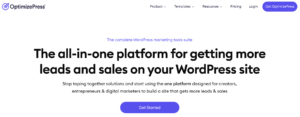Leadpages, a renowned platform for building landing pages and websites, extends its functionality beyond mere page creation by offering seamless integrations with various Customer Relationship Management (CRM) systems.
This integration capability significantly enhances the utility of Leadpages for businesses, enabling them to send contact information gathered through Leadpages directly into their CRM systems.
The CRM platforms that Leadpages supports include Salesforce, Pardot, PipeDrive, ZoHo CRM, Agile CRM, and Microsoft Dynamics 365 CRM, among others. These integrations, however, are predominantly available with Advanced plans.
🫵Try Leadpages Today – 🤩 For Free 🤩
Table of Contents
The Benefits of Integrating Leadpages with a CRM
Streamlined Workflow
Integrating Leadpages with a CRM system automates repetitive tasks, thus reducing manual effort. This automation fosters improved collaboration between teams, making the overall workflow more efficient.
Improved Communication
Such integration facilitates enhanced communication and collaboration across various teams and departments within an organization, promoting a more unified working environment.
Enhanced Data Visibility
The integration provides real-time tracking and visibility of business operations data, which leads to better-informed decision-making and deeper insights into business performance.
Increased Efficiency
Automation through integration leads to heightened efficiency and productivity, optimizing business processes and reducing the time and resources spent on manual tasks.
The incorporation of Leadpages with a CRM system brings numerous advantages to businesses in terms of managing and utilizing leads and customer data. This integration plays a crucial role in improving sales and marketing outcomes.
Improving Lead Management with Leadpages and CRM Integration
Centralized Lead Storage
Leads captured on Leadpages are automatically added to the CRM, offering a centralized system for managing leads effectively.
Lead Prioritization
The integration allows businesses to prioritize leads based on their behavior and interests. This ensures that no leads are overlooked and facilitates targeted nurturing until they are ready for conversion.
Personalized Interactions
By analyzing lead behavior, businesses can craft more personalized and targeted marketing campaigns, which often result in higher engagement and conversion rates.
Enhanced Workflow and Automation
The integration streamlines workflow and automates various tasks, further contributing to increased efficiency and productivity.
These improvements are instrumental in streamlining lead generation, optimizing lead nurturing processes, and enhancing the conversion of leads into customers.
Data Privacy and Protection in Leadpages CRM Integration
Leadpages is committed to ensuring data privacy and compliance with regulations like GDPR and CCPA. The platform’s Privacy Policy clearly outlines how it collects, stores, processes, and shares personal information. Leadpages also collaborates with third-party vendors and service providers to ensure secure handling of personal information. This commitment is vital for maintaining trust and integrity, particularly when integrating Leadpages with a CRM system.
Features of Leadpages CRM for Email Marketing Campaigns
Leadpages CRM integration boasts several features that enhance email marketing campaigns:
- Segmentation of Leads: The CRM allows businesses to segment leads based on behavior and demographics, enabling targeted campaigns.
- Integrations with Marketing Tools: Leadpages integrates with various marketing and sales tools for a more streamlined workflow.
- Instant Email Sending: Features like integration with Agile CRM facilitate the instant sending of emails to leads or their automatic addition to automated sales and marketing campaigns.
- Lead Management Tools: Leadpages offers robust tools for collecting unlimited leads, managing contacts, and converting prospects into paying customers.
- Integration with Email Marketing Platforms: It seamlessly synchronizes with email platforms such as Mailchimp, AWeber, ConvertKit, and ActiveCampaign, ensuring subscribers are immediately added to email lists upon opting in.
These features enable businesses to manage and segment leads effectively, integrate with email marketing platforms, and automate email sending, thus enhancing the overall effectiveness of their email marketing efforts.
In conclusion, Leadpages’ integration with CRM systems is a powerful feature that offers multiple benefits, including streamlined workflows, improved communication, enhanced data visibility, and increased efficiency. These integrations not only facilitate better lead management but also ensure data privacy and security, making Leadpages an invaluable tool for modern digital marketing strategies.
🫵Try Leadpages Today – 🤩 For Free 🤩
Frequently Asked Questions (FAQs)
Q1: Is a CRM system included in Leadpages’ basic package?
A1: Yes, Leadpages now includes a robust CRM system in its basic package, offering seamless integration and comprehensive lead management tools.
Q2: Can Leadpages integrate with any CRM software?
A2: Leadpages integrates with many popular CRM systems, including Salesforce, Pardot, PipeDrive, ZoHo CRM, Agile CRM, and Microsoft Dynamics 365 CRM. However, it may not support every CRM software, so it’s best to check for specific CRM compatibility.
Q3: How does Leadpages handle data privacy in CRM integrations?
A3: Leadpages is committed to data privacy and complies with regulations like GDPR and CCPA. It ensures secure data handling by working with third-party vendors and service providers who adhere to strict data protection standards.
Q4: Are there additional costs for integrating Leadpages with a CRM?
A4: While Leadpages itself may not charge extra for CRM integrations, the CRM services themselves might have their own pricing structures. Users should check with the specific CRM provider for any additional costs.
Q5: How does CRM integration improve lead management?
A5: CRM integration helps in centralized lead storage, lead prioritization, and allows for more personalized marketing strategies. It automates and streamlines the process of managing leads, making it more efficient and effective.
Q6: Can Leadpages CRM integration support email marketing campaigns?
A6: Yes, Leadpages CRM integration can significantly support email marketing campaigns by allowing for lead segmentation, integration with email marketing platforms, and automation of email sending, among other features.
Q7: What if my CRM is not listed as one of Leadpages’ integrations?
A7: If your CRM is not listed, you can check with Leadpages’ customer support for possible custom integrations or use third-party integration tools like Zapier as an alternative solution.
Q8: Is technical expertise required to integrate Leadpages with a CRM?
A8: Basic integration can generally be done without extensive technical knowledge. However, for more complex setups or custom integrations, some technical expertise might be beneficial.
Q9: How does Leadpages ensure secure transfer of data to CRM systems?
A9: Leadpages uses secure protocols and works with CRM systems that adhere to high data security standards, ensuring that the transfer of data to CRM systems is secure and compliant with privacy laws.
Q10: Can I track the performance of my Leadpages campaigns in my CRM?
A10: Yes, once integrated, most CRM systems will allow you to track and analyze the performance of your Leadpages campaigns, offering insights into lead behavior and campaign effectiveness.
By addressing these common inquiries, businesses and users can better understand how Leadpages and CRM integration can optimize their marketing and lead management strategies.




